
Issue #65: Saturday 4 May, 2024
My reading has been a little disappointing over the last couple of weeks, rescued somewhat by a piece of early SF by H. G. Wells.
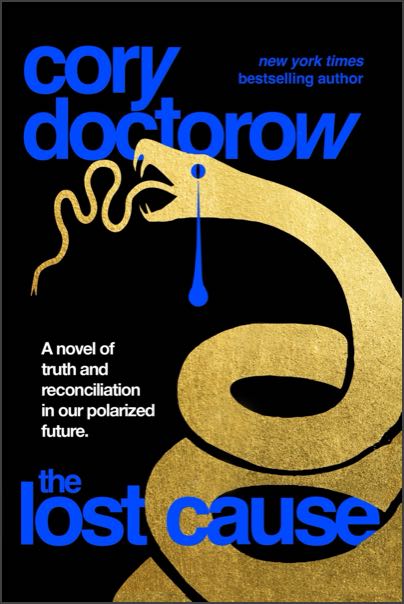
Published last year (2023), this is a near-future science fiction novel, set perhaps ten or twenty years from now in Burbank, California.
The scenario is of an America which has had a very progressive President by the name of Uwayni, who served for two terms and during that time implemented the ideas of the Green New Deal, heavily restricted gun ownership and so on – basically implementing the liberal dream. In a reaction to that, she has recently been replaced by a Republican President who is trying to undo some of these moves.
Although Donald Trump is never mentioned by name, there are still a lot of grumpy old white men around, wearing faded MAGA hats and continuing to talk of violent revolution to overturn all this liberal nonsense – that’s their Lost Cause (a term originally used to whitewash the Confederate cause in the U.S. Civil War as being about State rights rather than preserving slavery).
One of those grumpy old men is the grandfather of the first-person protagonist of the novel, young Palazo Brooks. Brooks makes a living by doing paid environmental work on a casual basis under the Green New Deal scheme set up by President Uwanyi.
As the book opens, Brooks is living in the old family home in Burbank with his grandfather, who was forced to take him in after Brooks’ parents died in a pandemic. Gramps regularly holds meetings with his Maga friends in the house during which they bitch about the current state of things, driving young Brooks to distraction. However, Gramps dies early on in the story, leaving the house to Brooks and triggering off a series of unexpected consequences.
What the book does well is depicting an America dealing with the effects of climate change, whose impacts are still severe despite a decade of attempts to roll it back. One major impact is a host of refugees, forced to leave their homes in coastal areas flooded by rising sea levels, or inland areas now too hot and dry to support life any longer. Under the Green New Deal, these expected refugees are supposed to be welcomed and housed by communities in more fortunate parts of the country. Human nature being what it is, however – and with the noisy presence of the Maga groups – there’s a lot of resistance to doing the right thing when these refugees actually begin to arrive. Brooks and his friends are determined to do the right thing, but find it a difficult and at times very dangerous task.
Amidst all this there’s a love story angle, but in this case the course of true love does run smooth, so there’s not much tension to it. Well, smooth apart from the moment late in the book which is there to prove that Guns Are A Very Bad Thing.
At times the story seems to drag a little, and you become impatient for it to get on. And it’s a very simplistic take of the complexities of the situation depicted. There’s not a lot of real character development or change. Brooks and his friends are so obviously meant to be the Good Guys and the old Maga men so obviously meant to be the Bad Guys that there’s no depth to the plot, and no surprise at the end when the Good Guys end up winning.
Look, this was readable enough, and there are some interesting ideas, but overall it was weak sauce.
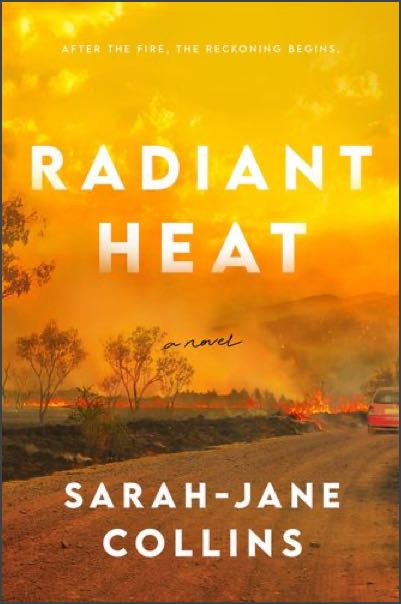
This is a recently-released crime/thriller by an Australian author who now lives in New York.
We have some truly excellent crime writers in Australia, and so when I saw this featured as a new release in the Readings Bookstore newsletter I was interested to get hold of a copy, and I was able to borrow it from the library.
Unfortunately, I’ve rarely been so annoyed by a novel.
It begins well enough, with the protagonist Alison King cowering under a wet woolen blanket in her bathroom as her house begins to burn around her. She’s right in the middle of a raging bushfire, terrified and sure that she’s going to die. However, a sudden wind-change saves her life, and she escapes the house, which is miraculously only partially damaged. But smouldering trees are all around and fallen trunks block her dirt driveway, preventing her from driving to the nearest town, Lake Bend, a rural place in Victoria, Australia. She’s going to have to walk there to get help.
Before she reaches the main road, however, she’s astonished to see a strange car at the start of her dirt driveway. Inside the car she sees a woman at the wheel. The woman is dead, presumably killed by radiant heat. It’s not anyone Alison knows, and when she is able to get the car door open, she examines the woman’s bag and purse. Inside the purse is a slip of paper bearing Alison’s address. This strange woman was on her way to see Alison. But why?
It’s an interesting scenario, and there’s some good description of the bushfire and its effects. But… From then on, Alison makes a series of simply foolish decisions. In fact, the whole plot of the book really depends on the foolish chain of decisions she keeps making. All of her friends, the police, and even a reporter keep telling her to do the sensible thing, and she mostly just doesn’t. At times, I came very close to throwing the book aside, if not across the room.
For instance, though of course she reports the dead woman in her driveway to the local police, she inexplicably conceals from them the fact that the woman had Alison’s address in her purse.
Slight spoiler here: Alison eventually discovers that the woman, Simone Arnold, is from Cairns, living in the same block of flats where Alison had been living until recently. And it turns out that Simone also had the same violently-abusive boyfriend, Gil, with whom Alison had broken up with the year before. If Simone was fleeing this man why would she have been seeking out Alison? Alison is terrified of Gil, and becomes convinced that he must have murdered Simone somehow, before the fire hit (pretty unlikely, this).
But rather than discuss all this with the police and tell them everything she knows, she (again inexplicably) drives off on her own, heading back to Cairns, determined to investigate on her own.
I don’t want to detail all the poor decisions Alison makes, but they are so numerous that at times I was left just shaking my head. Yet without them there wouldn’t be much to the story.
One small example late in the book: she’s in her car when she spots a brown snake on the road ahead of her. Brown snakes, as you may know, are among the deadliest of all venomous snakes. She’s safe, in her car, easily able to drive around or over the snake, but no, she stops the car and gets out. She has nothing to kill the snake with and has to resort to throwing rocks at it to annoy it enough that it slithers off rather than attacking her. Why didn’t she stay in the car?? I don’t know, maybe this was supposed to be a metaphor, with the snake representing Gil, but if so it’s a pretty laboured one.
Perhaps we’re meant to forgive Alison her poor decision-making because of the trauma she has suffered at the hands of Gil? Well, maybe, but while I did of course feel sympathy for her, that’s overlaid by the annoyance of how often she acts against her own clear self-interest.
So, I’m sorry, this was not for me. Your mileage may vary.
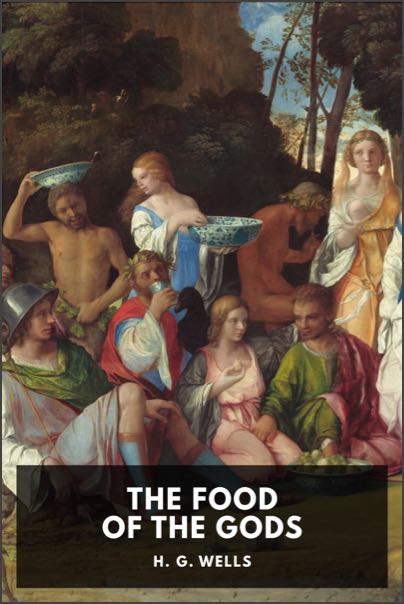
This was another production I did for Standard Ebooks. As a reminder, Standard Ebooks is dedicated to producing high-quality, beautifully-formatted ebooks of works which are in the public domain.
The full title of the novel is The Food of the Gods and How It Came to Earth. Published by H. G. Wells in 1904, it is a somewhat satirical look at society and how one invention or discovery could overturn its settled state.
In the early twentieth century, two scientists develop a substance to promote continuous growth in plants and animals. In testing it on poultry at an experimental farm, the “Food of the Gods” is carelessly scattered about, resulting in giant insects, giant rats and so on. When anxious parents give it to sickly children, it creates a race of giant humans. (All of these huge animals and people are described as being scaled exactly in proportion, without any regard to the realities of physics which would dictate that a huge human would need far thicker and more sturdy legs to bear their weight. But set that aside.)
The struggles of these children to overcome the fear of ordinary-sized humans and find a place for themselves in the world are well-depicted.
Though there are many touches of humor, the book ends on a much more serious and thoughtful note, and includes a warning against unchecked technology in the hands of capitalism. It also points out how easily a rabble-rousing politician can incite hatred towards those who are different.
The book inspired many later works such as movies, though I suppose the idea of huge humans, ants, etc. goes back as far as Gulliver’s Travels and earlier.
An enjoyable light read. You can download a free ebook copy here.
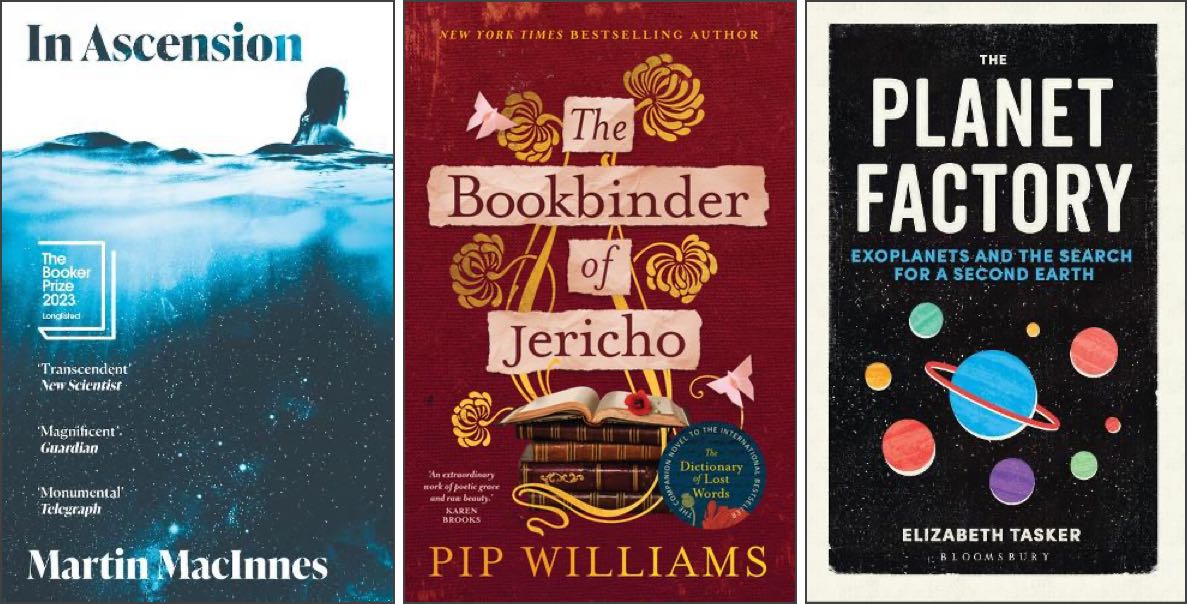
We’re still signed up to the Apple TV+ platform, having signed up a few months ago to watch the third season of Slow Horses, an excellent spy/thriller show with quite a bit of rough humour. While we are still paying the subscription, I watched the two shows I talked about last time, Constellation and Silo. And then looked for something else.
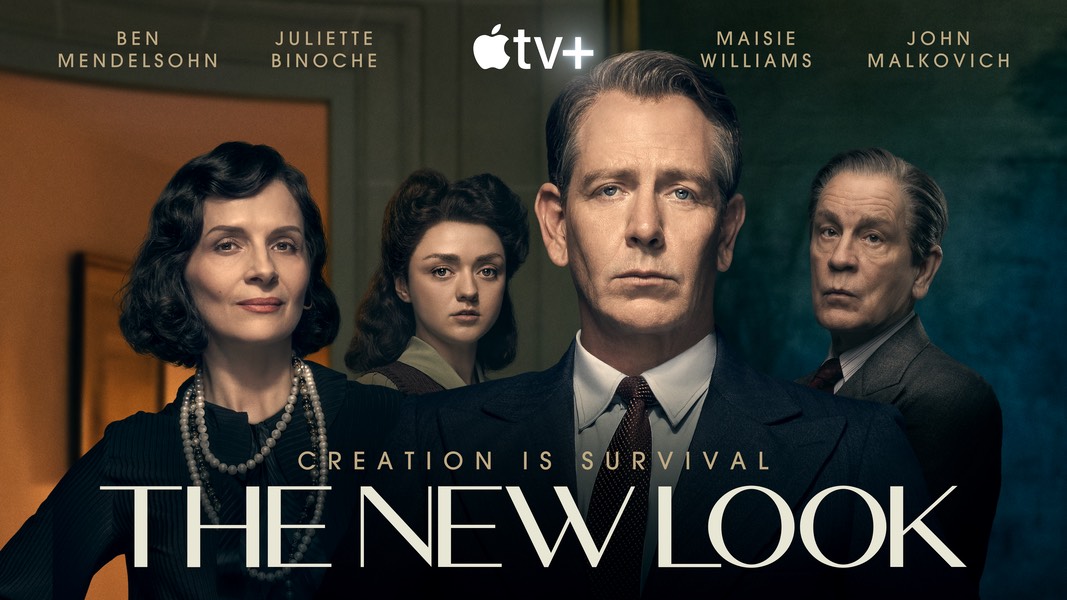
Not the kind of show I would normally think of looking at, thinking that it was all about women’s fashion. But my wife showed an interest and so we watched it.
We need to start with a disclaimer shown at the beginning of each episode: the story is “inspired by true events” (my emphasis), so I think we can assume that it doesn’t follow those events too closely.
Women’s fashion certainly plays a part in the story, but it begins in a much grimmer way as Christian Dior recalls life in Nazi-occupied Paris, and the dangerous work of the French Resistance, of which his younger sister Catherine is a part. We also follow the story of Coco Chanel, who comes across as a vain, extremely self-interested woman who is seen as a useful asset by the Nazis. At one point she is despatched to Madrid to try to get a message to Winston Churchill, a message from a group of disaffected high-level German officers who want to negotiate an end to the war between Britain and Germany. This mission becomes somewhat of a farce.
The show has an excellent cast: the Australian actor Ben Mendelsohn as Christian Dior, Maisie Williams as his sister Catherine, Juliette Binoche as Coco Chanel and John Malkovitch as Monsieur Lelong. I haven’t seen Malkovitch in anything for years. Maisie Williams is of course memorable for her early role in A Game of Thrones.
Grim watching at times, but very well done and enjoyable.
Printable version (PDF) here.
Comment on Issue 63
1/4/2024
Rose Mitchell
Yes, I enjoyed Doctorow's Red Team Blues. I can recommend his Little Brother, too (the title is a play on the Big Brother of Orwell's 1984, of course).
—David
Comment on Issue 63
21 April 2024
Mark Plummer
Hello David,
Catching up on various things on my reading list, I’ve reached TTB#63 where you ask: ‘How have your tastes shifted over the years? Send an email to the address at the bottom of the page and let me know.’
At the Eastercon this year we were out for dinner with a couple of friends and one asked us what SFF we’d been reading lately. Claire was able to be eloquent about a couple of recent novels but I found myself struggling to think of anything and ended up being slightly incoherent about The Ministry of Truth: a biography of George Orwell’s 1984 by Dorian Lynskey which I guess is sort-of SFF-by-association.
I think the pattern of my reading now is pretty much like yours and having checked what I’ve been reading so far this year I think it matches yours exactly: ‘mostly non-fiction, crime, thriller, “literary”; or else classic SF works of the 1920s, 1950s and 1960s.’ I suppose technically I’d need to expand the latter to include the 1980s, for all that it still feels a bit odd to me to think of the 1980s as classic rather than contemporary, as I’ve been reading some old issues of F&SF, working backwards from July 1988, the first issue I read hot off the newstand. There is a slight cross-over between literary and sf in that a few of the new sf books I have read have been published as mainstream and so could count as either, for instance Prophet’s Song by Paul Lynch, last year’s Booker winner which is set in a near-future totalitarian Ireland.
The comparison with the first four months of 1993, picked because it’s thirty years ago and I have records for it, is striking. I read 59 ‘book-like objects’, a term I use to encompass fiction magazines as well as books because I read them cover to cover like a short anthology or collection. Of those, 33 were books, 21 were contemporary fiction magazines (F&SF, Asimov’s, Interzone and so on) and five were old magazines, back issues of Astounding, If, and again F&SF. And of those 59, only one -- Northanger Abbey -- was outside of the SFF genre. I admit that surprised me. I’d expected an SFF majority but not a near totality.
So it is a striking change. And why? There’s a slightly distorting factor in that I was a Clarke Award judge in 1993 and at the beginning of the year I was still reading 1992 submissions and in February/March I was re-reading the short-list. Thus I was reading SFF as a kind of work, I guess in the way you now often read older SFF ‘for a specific purpose rather than for pleasure’. I was also trying to keep up with monthly issues of F&SF, Asimov’s and Interzone, something I’ve long since abandoned. I admit that a lot of my reading is now driven by price in that, for all it’s not entirely logical, I still balk at paying more than a couple of quid for ebooks and ideally not more than 99p. But then I do find that, just as in the old days when I’d generally wait for a print book to come out in cheaper paper edition or even get remaindered, a lot of new books do find their way onto discounted lists after a few months.
I do feel a bit bad about the drift away from SFF, especially as it’s been a drift towards crime and that’s such a cliche thing to do. Then again, I suppose there must be a reason why so many SFF readers do find themselves drifting crimewards. It’s a boringly practical consideration but I find myself put off so many modern SFF novels because they’re so long. Anything much more than 400 pages is an immediate turnoff and I feel I’m making a concession in tolerating even that. I am far more likely to be drawn to something if it’s below 300. I also feel that I’ve lost the sense of centrality. I used to know where the literate middle lay, the books that all the tastemakers read. And now I don’t.
Maybe then, now that I have the time on my hands that comes with being retired, I should resolve to try to reconnect with my home genre. And I wonder if it’s significant that I haven’t actually resolved to do so.
Thanks for continuing to produce TBB. Always a good source of recommendations.
-- Mark Plummer Croydon, UK
I have no idea how long it is since I last read a science fiction magazine. Many, many decades, I’d say. Over the last couple of years it’s true that I read some short science fiction: short-stories, novelettes, novellas -- but only for those episodes of the podcast where we were either discussing the Hugo Awards in the 1950s and 1960s, or else the current year’s nominees. I certainly have no interest in reading short SF for pleasure these days.
Like you, I generally but not always balk at very long SF novels: some exceptions being the nine volumes of The Expanse by James S. A. Corey, and anything by Neal Stephenson. Long fantasy I find a complete turn-off. But it’s not an objection to long books in general. Over the last five years I’ve read some very long books (the novels of Donna Tartt, for example) with great pleasure.
—David
Comment on Issue 64
20 April 2024
Bruce Gillespie
Very surprised to see your TV reviews. I might have tried watching them as well except we still don’t have the ability to stream. I’ve heard mentions of various TV SF series that sound intriguing over the last few years, but none of them has appeared on disc yet.
I hope you enjoy In Ascension as much as I did -- an SF book that is all the more interesting for not solving any of its more intriguing mysteries. Very well written, though, with a memorable main character.
Thanks for the recommendation about In Ascension, it's waiting for me to pick up at the library, I'm looking forward to getting in to it.
—David
If you’d like to make a modest contribution to my efforts in this newsletter, I’d love it if you would buy me a coffee.
Want to comment? Please send an email to:

© Copyright 2024 by David R. Grigg
and licensed under Creative Commons License CC BY-ND 4.0.
Thanks for the recommendations, will take a look into Dark Matters.
My genre reading has also shifted from mainly science fiction & fantasy to crime also. Last year I read more crime/thriller than SF. One of the best was Cory Doctorow’s Red Team Blues a mash up of tech and LA Noir, not sure of what was actually today’s tech and what was SF. Cyber espionage best describes it. Highly recommend.